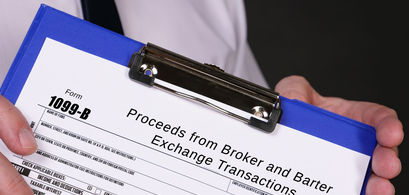Definition
The term Form 1099-B refers to an Internal Revenue Service document issued by a broker or barter exchange that summarizes the proceeds from the liquidation, redemption, or sale of stock. The information reported on IRS Form 1099-B (Proceeds from Broker and Barter Exchange Transactions) is subsequently used by taxpayers to complete Schedule D of Form 1040.
Explanation
When an investor liquidates, redeems, or otherwise sells shares of stock, they will realize a gain or loss on the transaction. Form 1099-B is completed by a broker or barter exchange and is used to record and report this gain or loss. Taxpayers will then use the information recorded on this form when completing their federal income tax return. The IRS requires these forms to be completed and sent to taxpayers by January 31.
The information contained on Form 1099-B includes:
The Payer's name, street address, city, state, zip code and telephone number.
The Recipient's name, street address, city, state, zip code and telephone number.
Federal identification and account numbers for both the Payer and Recipient.
A description of the property, the dates it was acquired and sold, the proceeds from the transaction, and the cost basis of the property.
Any profit or loss realized on closed contracts.
Any unrealized profit or loss on open contracts.
Gains or losses from bartering.
If the gain or loss was short or long-term, and if the information has been previously reported to the IRS.
State income tax withheld, if any.



